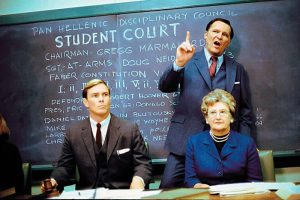
I was one of those annoying kids that always asked why. Trust me, I was annoying. I queried anything and everything. Why should I eat my vegetables? How come I had to dress up for certain occasions? Why was it rude to point and stare at people in public? No one ever explained it to me, at least not to my satisfaction. I wasn’t trying to be impertinent. It just seemed that life was filled with rules, customs, and standards of behavior about which I had no say. How did these codes of conduct come about? Who created them? Nobody seemed to know. And I don’t think I ever voluntarily submitted to a single one.
The threat of punishment was always present, coming from all sectors of society. Non-compliance was never a practical option. So I was always wary of any kind of behavior enforcement no matter how many times I was told it was for my own good.
I saw a great incongruity in the adage, “respect your elders.” Clearly an elder came up with that and I was certain that no child was ever consulted. I figured it was just a formal way of saying “shut up and do what you’re told.” It was like living in a world created by Dean Wormer, and I never liked it. Where was Delta House when I really needed them?
Moving forward to present time, I’m still asking why. And I’m still being told to shut up and do what I’m told. Except now, parents, teachers, playground supervisors, and babysitters have been replaced with an overreaching bureaucracy that performs the same function. Sure, there are laws and regulations that make sense. But it seems more often than not, we’re getting shackled with excessive legislation based more on politically motivated agendas than on workable government.
Between 2001 and 2002 a new and peculiar political faction emerged that spoke to my relentless impulse to question the socio-political status quo. Andrew Sullivan, conservative writer, commentator, and former editor of The New Republic coined a term that became my battle cry for a new political breed. Sullivan called them “South Park Conservatives.”
It was a term used to describe young adults and teenagers who tended to be center-right in their political views as portrayed in the popular animated television program South Park. Though it was never really a conservative movement, it did embrace an anti-Left ethos that young people found particularly appealing. Fiercely anti-liberal and at times anarchic and even vulgar, it was more a reaction against political correctness as expressed by liberals than any kind of conservative ideology. If anything, it had more in common with libertarian-leaning principles than any left or right political philosophy.
South Park co-creator Matt Stone put the definition of South Park Conservatives in perhaps its most concise terms: “I hate conservatives but I really f**king hate liberals.” Never have so few words come so close to my own sentiments. Of course the comment was tongue-in-cheek hyperbole in the style of most of South Park’s humor—satire with a sliver of cutting edge truth. I got the point.
Fellow co-creator Trey Parker weighed in as well. “We find just as many things to rip on the left as we do on the right.” So do I. Specifically, I’m bothered by those who get hard-wired into their ideology and become inflexible in their thinking. I call them ideological purists. It doesn’t matter what the ideology is. If you have to consult your philosophy before you can make an observation, opinion, evaluation, or decision, you can miss the immediate situation in front of you. Reality doesn’t always conform to ideological precepts.
Sometimes ideological purists turn into ideological zealots. This is the home turf of the fanatic and true believer. Whether it’s a religious zealot, a political radical, or social revolutionary, these are the extremists in society, militant ideologues driven by some grand philosophical theory. Their minds are bulwarks of fixed ideas that are impermeable to change.
Rigid-thinking ideologues make ideal subject matter for South Park mockery. Needless to say, I wholeheartedly approve. Like Stone and Parker, I have no problem with skewering ideological purists with all due derision and ridicule. You can’t argue with them. May as well make fun of them.
The South Park Conservative phenomenon has since dwindled to near non-existence, though I still embrace the concept. And I consider myself part of an independent post-liberal counterculture that holds the media in contempt and mercilessly mocks the popular culture. I take heart in the possibility that there are fearless nonconformists, iconoclasts, and political heretics out there that exist in numbers too big to ignore, who might be able to bring down the socio-political status quo a notch or two.
For me, South Park has been a continuous work-around demonstration against the “shut up and do what you’re told” mentality of the Dean Wormers of the world. Now if you’ll excuse me, I have to go out and buy ten thousand marbles. And someone should tell Wormer that there’s going to be a slight change in the parade lineup.

Be the first to comment